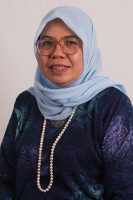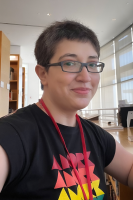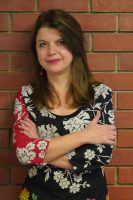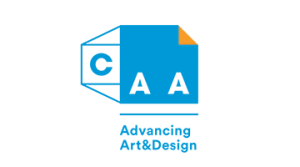CAA News Today
Call for Applications: CAA-Getty International Program 2026
posted by CAA — March 12, 2025
CAA will begin accepting applications for the CAA-Getty International Program on March 15! Thanks to generous support from Getty, the program—now in its fifteenth year—enables scholars from around the world to travel to Chicago to participate in the CAA 114th Annual Conference, February 18–21, 2026. The program features a preconference colloquium on international issues in art history, followed by a week of sessions, workshops, events, museum visits, and professional development opportunities.
To date, the program has gathered 179 scholars from sixty-one countries, and continues to have significant global impact on the field. These annual convenings have yielded collaboration, community, and lasting connections while also serving to diversify CAA membership, increase international presence at CAA conferences, and foster greater cross-cultural discourse around international art scholarship and practice.
We also invite alumni of the program to apply to return and support first-time participants, take part in program events, and present new scholarship at the Annual Conference in our dedicated CAA-Getty International Program Alumni Session.
The individuals selected for the 2026 program will receive a one-year CAA membership, have their conference registration fee, travel expenses, and accommodation costs covered, and will receive per diems for meals and incidentals.
International art historians, curators, and other visual arts professionals are encouraged to apply!
Visit our CAA-Getty page for eligibility and application requirements. All interested Getty applicants, whether new scholars or alumni, will need to submit a general conference application (individual presentation proposal) and indicate their interest in participating in the CAA-Getty International Program.
Deadline: April 25
This program is made possible with support from Getty.

CAA113 CAA-Getty International Program Participants Announced!
posted by CAA — December 11, 2024
The CAA-Getty International Program will welcome eight new scholars and four program alumni to the CAA 113th Annual Conference!
Now in its thirteenth year, this program brings a cohort of art historians, museum curators, and other visual arts professionals from around the globe to the CAA Annual Conference to connect with a selection of former participants at a preconference colloquium and alumni session, which examine topics such as historiographies, interdisciplinary and transnational methodologies, decolonizing museums, and other pressing issues in the field.
The 2025 preconference colloquium will be led by special guest Clement Akpang.
Read more about the 2025 program participants below, visit our website to learn more about the first ten years of the CAA-Getty International Program, and register for CAA113!
2025 PARTICIPANTS
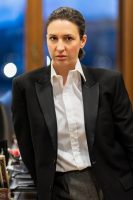 |
Aida Bičakčić obtained her degree in art history from the Faculty of Philosophy at the University of Sarajevo in 2008. From 2009 to 2023 she has held the positions of advisor for movable heritage, and later advisor for art history at the Commission to Preserve National Monuments of Bosnia and Herzegovina, for which she was involved in numerous research projects that resulted in designating cultural assets as National Monuments of Bosnia and Herzegovina. Starting in April 2023 she continued her career as the head of the collection at Ars Aevi, Sarajevo, curating a traveling exhibition of the collection, Sol LeWitt at KRAK Center for Contemporary Culture, and the Ars Aevi Video Art project, while also acting as jury member for a competition for young artists. In 2022, she began her PhD at Faculty of Humanities, Zagreb University, with a focus on history of conservation with the thesis “Protection of Architectural Heritage in the People’s Republic of Bosnia and Herzegovina between 1945 and 1960.” |
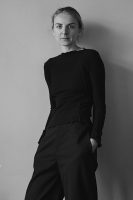 |
Inesa Brašiškė is a Vilnius-based art historian and curator. She holds an MA from the Modern and Contemporary Art: Critical and Curatorial Studies program (MODA) at Columbia University. Her curatorial practice spans multiple institutions including the National Gallery of Art (Vilnius), Contemporary Art Centre (CAC, Vilnius), e-flux screening room, and Art in General. Following a decade of independent curatorial work, she now serves as head of research at the Sapieha Palace, a CAC branch, where she curates contemporary art exhibitions, directs a monthly artists’ film program, and organizes an annual symposium. Brašiškė’s academic research focuses on conceptual art and displacement, artistic labor, feminist art history writing in Eastern Europe, and avant-garde cinema and feminist screen cultures since the 1960s. Brašiškė’s recent scholarship reconsiders abstract painting through feminist histories of making, examines the critical potential of blurring, and explores artistic and curatorial engagements with archives in the Baltics.Her writing has appeared in MoMA’s C-MAP and Mousse as well as in numerous exhibition catalogs and books. Brašiškė was nominated for the ICI Curatorial Award in 2014. Her research has been supported by the Getty Library Research Grant, the Paul Mellon Centre Grant, and the AWARE Research Residency. |
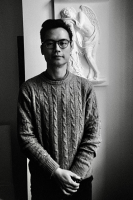 |
Conan Cheong is a PhD candidate in art history and archaeology at SOAS University of London, holding an MA from the same department. His doctoral research, centering on the personal collections of Buddhist monks in Laos of historical photographs and objects. investigates how Buddhist communities conceptualize the self through material practices of memory, memorialization, and representation. He is curatorial advisor for the Museum of Buddhist Art in Vat Saen Sukharam, Luang Prabang (opening in 2026). As curator at the Asian Civilizations Museum, Singapore, from 2016–23, he worked to develop collaborative relationships with source and use communities, and in the exhibition Body and Spirit: The Human Body in Thought and Practice (2022–23). He is a member of Circumambulating Objects: On Paradigms of Restitution of Southeast Asian Art (CO-OP). |
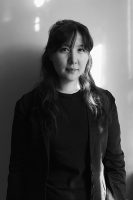 |
Goomaral Dalkh-Ochir is an art historian at the Fine Arts Zanabazar Museum in Ulan Bator, where her research focuses on the history of Mongolian fine art and the study of Mongolian Buddhist art. She completed her bachelor’s and master’s programs in art studies at the National University of Mongolia, focusing on the topic of Zanabazar art, and she is currently pursuing a doctoral program. From 2014–16, she served as a lecturer in medieval art history at the Mongolian National University of Arts and Culture. Since 2014, she has compiled five catalogs that explore the history of Mongolian Buddhist art. She was a coauthor of the book Unique Masterpieces (2018). Since 2017, she has been a member of the Museum and Collection of fine Arts Committee of the International Council of Museums. |
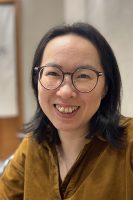 |
Jing Liu is an assistant professor at the Sichuan Fine Arts Institute, China. She received her PhD in art history from Peking University with a dissertation on religious art in southwest China from the tenth to thirteenth centuries. Building on this work, she published The Transformation and Creation of Images: A Study of Guardian Deities of the Song Dynasty in Dazu and Anyue, Sichuan (2024). She is currently working on a new book about natural aesthetics in Chinese landscape painting. Recently, her academic focus has expanded to explore the relationship between cultural heritage and community, including a project examining how patrons, tourists, and pilgrims have interacted with Buddhist carvings over time. As a curator at the Ptolemy Museum in Hong Kong, she is also interested in the spread of Western astronomical imagery in modern China, drawing insights from the museum’s collections. |
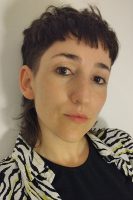 |
Nadia Martin is an assistant researcher at the National Scientific and Technical Research Council of Argentina (CONICET), currently on a postdoctoral fellowship granted by the same institution until her appointment is formalized. She holds a PhD in comparative theory of the arts (CONICET-UNTREF), a master’s degree in visual arts curating (UNTREF), and a bachelor’s degree in communication sciences (UBA). Her research focuses on body, territorial, and techno-scientific imaginaries in contemporary artistic practices, with an emphasis on Latin America. It is framed by perspectives at the intersections of feminisms, new materialisms, and critical posthumanisms. She is involved in the PIP-CONICET and PICT-AGENCIA research projects. Among other distinctions, she is the recipient of the Goethe-Fellowshipat documenta Archiv, the ZUKOnnect Fellowship, and support from the Casa de Velázquez (Madrid). She teaches undergraduate and graduate courses at UNTREF and undergraduate courses at UBA. She is founder and manager of the ENROQUE art-in-territory project. |
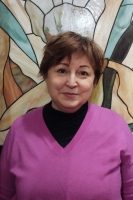 |
Oksana Remeniaka is a chief of department of sociocultural art studies at the Modern Art Research Institute of the National Academy of Arts of Ukraine (Kyiv). She is the author of books and numerous articles on art history and culture. Dr. Remeniaka was a Fulbright Research Scholar, conducting research at Columbia University’s Harriman Institute with the project (2019–20). Dr. Remeniaka is an expert in cultural processes of Polish-Ukrainian borderland, Ukrainian culture at the turn of the nineteenth century, diaspora visual arts of the interwar and postwar periods, and wartime Ukrainian modern art. She is the author of of numerous texts for modern art exhibits and projects in various Ukrainian museums and galleries, including A Chronicle of Inspiration in a Fierce Time (2023), Art in Times of Plague with a virtual catalog of artists’ works from Ukraine, Poland, the United States, Italy, and Georgia (2020). |
 |
Lucía Stubrin holds a PhD in history and theory of the arts from the Universidad de Buenos Aires and is a research professor at the Universidad Nacional de Entre Ríos (Argentina). She directs research projects within the framework of the Grupo de Estudio Biosemiótica, Arte y Técnica (GEBAT), and is an independent curator specialized in technopoetics. She is the author ofBioarte. Poéticas de lo viviente (2020, Eudeba/Ediciones UNL). Since 2010, she has received national (CONICET) and international (Getty Foundation, European Commission Erasmus Mundus, Fundación Carolina, AUGM) doctoral and postdoctoral grants for her research in the field of art-science-technology with emphasis on life sciences and bioart. Since 2023 she has been a research fellow at the Universidad de Barcelona. |
ALUMNI PARTICIPANTS
This program is made possible with support from Getty through its Connecting Art Histories initiative.

Call for Applications: CAA-Getty International Program 2025
posted by CAA — July 10, 2024
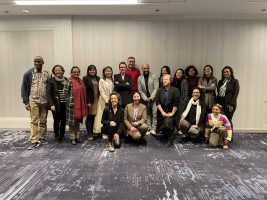
CAA is currently accepting applications for the CAA-Getty International Program! Thanks to generous support from Getty, the program—now in its thirteenth year—will enable scholars from all over the world to travel to New York to participate in the CAA 113th Annual Conference, February 12–15, 2025. The program features a preconference colloquium on international issues in art history, followed by a week of sessions, workshops, events, museum visits, and professional development opportunities.
The CAA-Getty International Program was established to diversify CAA membership, increase international presence at CAA conferences, and foster greater cross-cultural understanding of different contexts and methodologies of art scholarship and practice. Rigorous dialogue between international scholars and their North American peers has yielded collaboration, community, and lasting connections: CAA-Getty alumni have worked together on publications, exhibitions, convenings, and many other projects. To date, the program has gathered over 150 scholars from sixty countries and continues to have significant global impact on the field. Many participants become CAA ambassadors in their respective countries by sharing knowledge acquired during the program with their colleagues at home.
The individuals selected for the 2025 program will receive a one-year CAA membership, conference registration, travel expenses, hotel accommodations, and per diems for meals and incidentals. International art historians, curators, and other visual arts professionals are encouraged to apply.
Visit our website for detailed guidelines and to apply.
Deadline: August 15
This program is made possible with support from Getty.

Meet the 2024 CAA-Getty International Program Participants
posted by CAA — November 29, 2023
CAA is pleased to announce this year’s participants in the CAA-Getty International Program. Now in its thirteenth year, this international program, supported by the Getty Foundation, welcomes twelve new participants and four alumni to attend the 2024 Annual Conference in Chicago, IL. The goal of the CAA-Getty International Program is to increase international participation in CAA’s activities and the field of visual arts in academia, thereby expanding international networks and the exchange of ideas both during and after the conference. We look forward to welcoming this year’s participants!
At a preconference colloquium, the new participants will discuss key issues in the international study of art history together with CAA-Getty alumni and US hosts. The program will delve into topics such as postcolonial and Eurocentric legacies, decolonization of museums, scholarship and pedagogy, interdisciplinary and transnational methodologies, and the intersection of politics and art history. Learn more about the first ten years of the program in our online publication.
Program participants—art historians, curators, and artists—hail from multiple countries, expanding CAA’s international membership and contributing to an increasingly diverse community of scholars and ideas. Selected by a jury of CAA members from a highly competitive group of applicants, each participant will receive funding for travel, hotel accommodation, conference registration, CAA membership, and a per diem.
Alumni invited back to the 2024 conference will present at the Art, Authenticity, Migration, and Global Climate Change session while also connecting our new participants to our burgeoning group of nearly 160 CAA-Getty International Program alumni.
2024 PARTICIPANTS IN THE CAA-GETTY INTERNATIONAL PROGRAM

Mariela Cantú is a researcher, audiovisual preservationist, artist, and curator. She is a PhD candidate in Art History at the University of San Martín (CIAP-UNSAM CONICET) and holds a master’s degree in Preservation and Presentation of the Moving Image (University of Amsterdam). She is a member of RAPA—Argentinian Network of Audiovisual Preservationists, and the creator of Arca VIDEO, a collaborative archive of Argentinian video art. She has undergone specific training on video preservation at Associação Cultural Videobrasil (Brazil), La Camera Ottica (Italy), Media Burn Archive and Video Data Bank (USA), and Cinemateca Boliviana (Bolivia), while also attending the Film Preservation and Restoration School Latin America (CINAIN, Cineteca de Bologna, L’Immagine Ritrovatta and FIAF). She has been a professor at Universidad de Buenos Aires, Universidad del Cine, Universidad Nacional del Arte, and Universidad Nacional de La Plata, among others.
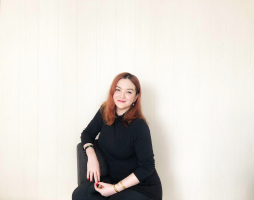
Kathleen Ditzig is a curator at National Gallery Singapore. She received a PhD from Nanyang Technological University in 2023 with a dissertation titled “Exhibiting Southeast Asia in the Cultural Cold War: Geopolitics of Regional Art Exhibitions (1940s–1980s).” She obtained an MA from the Center for Curatorial Studies, Bard College, in 2015. Inspired by her experience in cultural policy, Ditzig studies modern and contemporary Southeast Asian art in relation to global histories of capitalism, technology, and international relations. As a curator and researcher, she is invested in advancing and interrogating art as an exceptional site and system of speaking to power. She won an IMPART Curatorial Award in 2021. Her writing has been published by Southeast of Now, Journal of Social Issues in Southeast Asia, Afterall, post: notes on art in a global context, Art Agenda, and Artforum, among others.
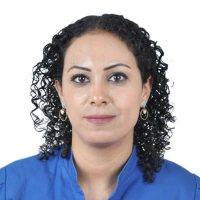
Marzouka Hanna Ibrahim Gaied has a bachelor’s degree in Egyptology from El Minya University, Egypt. Their research has focused primarily on the art of Middle Kingdom (about 2000 BCE) in the Beni Hasan al-Shuruq area of Middle Egypt, and they have wide-ranging experience working on many archaeological sites across Egypt. In their current position as Inspector of Antiquities at the Central Department for Seized Antiquities, they are on the front lines of addressing the trade in looted artifacts, which drains Egypt of its cultural resources. Their experiences have provided them with a deep knowledge of excavation techniques, collection management, and a passion for local community engagement.

Paweł Ignaczak graduated in art history at the Adam Mickiewicz University in Poznań, where he earned a PhD for his thesis on etchings of Jean Pierre Norblin de la Gourdaine (1745–1830) in 2013. Between 2003–15 he worked in the Print Room of the National Museum in Poznań and in the print collection of the Polish Library in Paris. From 2015–22 he worked at the Museum of Warsaw. Since 2015, he has been lecturing at the Academy of Fine Arts in Warsaw, and since 2020 he has been vice-dean at the Faculty of Artistic Research and Curatorial Studies. Currently, he’s been conducting research on amateur artistic work in Poland in the second half of the eighteenth and early nineteenth centuries.

Eyitayo Tolulope Ijisakin is an associate professor in the Department of Fine and Applied Arts, Obafemi Awolowo University, Ile-Ife, Nigeria. His doctoral research focuses on printmaking and the developmental history and contributions of printmaking to contemporary Nigerian art. He has written for Critical Arts and African Arts. Dr Ijisakin is a Fellow of the American Council of Learned Society in the African Humanities Program. He was a Postdoctoral Fellow with the Arts of Africa and the Global South, Rhodes University, South Africa (2017–18). He also received the Carnegie Corporation of New York Fellowship for the 63rd Annual Meeting of the African Studies Association (2020). He has served as a reviewer for several international journals. He is listed among the artists whose works engage social change by the Denver Art Museum, in 2022. He is a member of the Society of Nigerian Artists and the Nigerian Field Society.
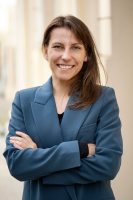
Agnieszka Patala is an assistant professor in the Institute of Art History, University of Wroclaw. The area of her academic focus is medieval art in Europe, with particular reference to panel painting and sculpture—the (multisensorial) relations of artworks with the viewer and space, their use in devotional practices, extra-religious realities of their functioning, including afterlives in the nineteenth totwenty-first centuries. In 2015 she wrote her dissertation on the impact of Nuremberg art and artists on late Gothic panel painting in Silesia. It was published in 2018 and served as a foundation for exhibition, Migrations: Late Gothic Art in Silesia (National Museum in Wroclaw). Currently, she is at work on her postdoctoral project determining the origins, functions, and agency of early altarpieces in Central Europe. She is also a co-investigator in the project, Residua of Premodern Relations with Art in Selected Contemporary Convents in Poland.
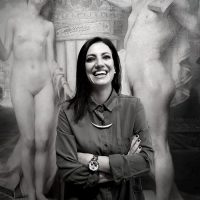
Elena Stylianou researches, writes, and curates at the intersection of the history and theory of photography, modern and contemporary art, critical studies, and museum and curatorial practices. She is currently associate professor at European University Cyprus and president of the International Association of Photography and Theory (IAPT). Her scholarship has been published in peer-reviewed journals and edited volumes, and she is co-editor of Museums and Photography: The Display of Death (Routledge, 2018), Ar(t)chaeology: Intersections of Photography and Archaeology (IAPT Press, 2019), and Contemporary Art in Cyprus: Politics, Identity and Culture Across Borders (Bloomsbury, Spring 2021). She is currently working on a special issue on processes of decolonization and the photographic archive. Elena earned her doctoral degree from Columbia University Teachers College, is a recipient of numerous awards and grants, including a Fulbright and an ArtTable fellowship, and she held a postdoctoral position at UCL, London. She has curated international art exhibitions in Cyprus, and is the lead researcher of several funded projects dealing with arts and heritage.
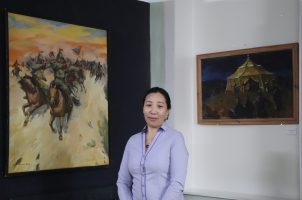
Suvdaa Sampil is a curator at the History and Local Museum of Tuv province, Mongolia, and has been working as a museum curator since 2011. They have written academic articles on cultural heritage research, art history, and interethnic relations that have been published in national and international journals. Moreover, they wrote the books Cultural Heritage of the Central Region and The Settlement of Ethnic Groups in the Tuv Province: Some Cultures and Traditions. After receiving a master’s from the University of Mongolia in 2007, their research concentrated mainly on Mongolian and local cultural heritage and art history. Sampil is in charge of the cultural heritage and collections at the museum and curates permanent temporary exhibitions. In 2016, they were a member of the International Committee for Museums and Collections of Modern Art (CIMAM), an Affiliated Organization of ICOM, and became a member of the International Committee of Museums (ICOM) in 2018.
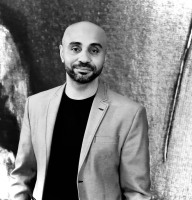
Igor Simões has a PhD in Visual Arts—History, Theory, and Criticism of Art at the Programa de Pós-Graduação em Artes Visuais da Universidade Federal do Rio Grande do Sul (PPGAV-UFRGS) and is the adjunct professor of History, Theory, and Criticism of Art and Methodology and Practice of Art Teaching (UERGS). He was assistant curator of the 12th Mercosur Biennial, member of the curatorial committee of the National Association of Fine Arts Researchers (ANPAP). He works with the links between exhibitions, film editing, art history, and racialization in Brazilian art and the visibility of Black subjects in the visual arts and is the author of the thesis “Film Editing and Exhibition: Black Voices in the White Cube of Brazilian Art.” He is also a member of the curatorial committee of the Museum of Contemporary Art at the University of São Paulo/USP. Curator of the exhibition “Presença Negra no Museu de Arte do Rio Grande do Sul” (2022). He is a member of the curatorial boards of the exhibitions Social Fabric and Enpowerment and a member of the board of AWARE—Archives of Women Artists, Research and Exhibitions and Fractured Times. In 2023 he was general curator of Dos Brasis: Arte e pensamento negro, the most comprehensive exhibition of Black Brazilian artists (Brazil- São Paulo). That same year he was guest curator at the Inhotim Institute for the 2023 season, curating the exhibitions Mestre Didi: The Initiates in Mystery Don’t Die and Doing the Modern, Building the Contemporary: Rubem Valentim and the Right to Form. In 2024, he will co-curate Rosana Paulino: Atlântica e Amefricana at Museo de Arte Latinoamericano de Buenos Aires (MALBA).
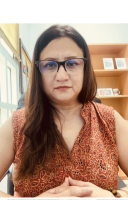
Trained as a studio artist with a major in sculpture, Kanwal Syed earned her PhD in art history from Concordia University as the 2023 Graduate Valedictorian. During her candidacy, she earned the prestigious FQRSC doctoral grant and numerous internal grants, published three journal articles, co-chaired two panels at the annual College Art Association conference, and presented papers at academic conferences in Vancouver, Brighton, Rome, and Chicago. Her dissertation titled “ھم گنہاگار عورتیں (We Sinful Women): Urban Feminist Visuality in Contemporary Art and Feminist Movements in Pakistan After 9/11,” garnered an Honorable Mention in the UC Berkeley South Asia Art & Architecture Dissertation Prize 2023 and has been nominated for NAGS Dissertation Award 2023–24. Before joining American University in Dubai as an Assistant Professor of Art history, she worked as an adjunct faculty at the University of British Columbia and as a part-time faculty at Concordia University. Her research interests encompass non-Western art, decoloniality and cultural feminist visuality in contemporary art.
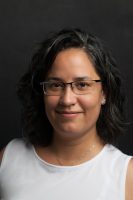
Carolina Vanegas Carrasco researches the processes of creation and reception of nineteenth-century monuments in Latin America. She is the current director of Centro de Estudios Espigas at the Universidad Nacional de San Martín, Argentina, and researcher of the Centro de Investigaciones en Arte y Patrimonio (CONICET-UNSAM). Vanegas is General Coordinator of the Group of Public Art Studies in Latin America based on the Universidad de Buenos Aires. She is the author of Disputas monumentales: escultura y política en el Centenario de la Independencia en Colombia (Bogotá, 1910) (2019, Instituto Distrital de Patrimonio Cultural of Bogotá).
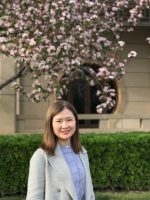
Fanying Zhang, an Assistant Professor in the Department of Arts Administration, Education, and Policy at the China Academy of Art, earned her Ph.D. in Art History in 2021. Her research focuses on unraveling how the Western world shaped its perceptions of Chinese art in the 20th century. She places particular emphasis on analyzing exhibitions, conferences, publications, and the contributions of scholars, artists, and curators to the global dissemination of Chinese art. Zhang’s academic career commenced with a graduate program centered on Osvald Sirén who had already been an accomplished scholar in the study of Trecento painting before getting involved in the study of Chinese art. After that, she expanded her interests in transcultural art history, particularly the role of Chinese art in constructing global art history. She has incorporated this interest into her teaching and is engaged in international collaborations. She is also involved in a project on Professor James Cahill’s archive initiated by the China Academy of Art, further enriching her experience in the field.
PARTICIPATING ALUMNI
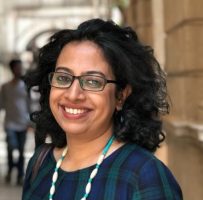
Amrita Gupta is an art historian, writer, administrator, and editor involved in arts education and cultural management. With over two decades in the nonprofit cultural sector in India, she has contributed through art historical research, teaching, published writing, arts programming, and institution building. In 2002, she joined the Mohile Parikh Center (MPC), Mumbai, and became its Program Director in 2005, a responsibility she served till early 2023. In this capacity, she facilitated critical thinking by curating a wide range of innovative art education programs, initiating public art projects, and co-creating short art videos for diverse audiences, and remains associated with the MPC in an honorary capacity. She is Founding Member and Co-director at the Council for Arts and Social Practice (CASP), established in 2013 as a transdisciplinary platform to facilitate critical dialogues on cultural sustainability. Her practice at CASP focuses on the interplay of social history, fieldwork, community-based art, and collective experience. She serves as a jury member for the Arthur Kingsley Porter Prize for Art Bulletin articles and the SAIL Mentorship Program (Edition III) at Sunaparanta Goa Center for the Arts. In 2019, she co-founded and edits the e-journal, Partition Studies Quarterly (PSQ), which focuses on partition narratives of Northeast India, and other less-remembered partition stories in the subcontinent. Her ongoing and independent research focuses on the art practices of Northeast India, and an essay on this topic has been published in the edited book 20th Century Indian Art (Thames & Hudson and Art Alive, 2022). Her art writings for anthologies, journals, exhibition catalogs, and magazines have been published widely in leading print and digital platforms; she has edited art books for children and continues to write on Indian modern and contemporary art.
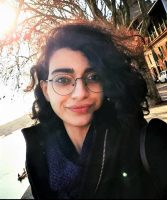
Delaram Hosseinioun received her first MA in literary criticism from the University of Exeter and her second MA in cultural studies from KU Leuven University. In her PhD project at Utrecht University, titled “Unveiling the Other: The Metamorphosis of Voices of Iranian Female Artists from the Mid-Twentieth Century to the Present Day,” Delaram draws from gender theories in poststructuralist psychoanalysis, such as in the works of Butler and Cixous, along with theories regarding self and forms of othering in continental philosophy, namely works of Bakhtin and Derrida. Her goal is to trace the trajectories and endeavors of Iranian female artists in reclaiming their identities. Working along with the artists Delaram explores the artworks as a pictorial form of dialogue and artists’ attempts in surpassing sociocultural restraints. Delaram’s focus rests on the revelation and universality of women’s voices in creative platforms, art journalism and interviewing artists beyond borders.
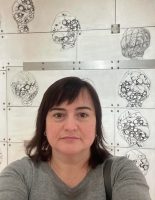
Mariana Levytska is an associate professor in the Department of Graphic Design and Artbooks of the Ukraine Academy of Printing. She works as a part-time senior research associate in the Department of Art Studies of the Ethnology Institute at the national Academy of Ukraine in Lviv. She received her PhD in the history of art from the Lviv National Academy of Arts in 2023. She specializes in Ukrainian art of the long nineteenth century through social art history optics. In 2022 she began a research project focused on artists’ response to the warfare in Ukraine, after the full-scale Russian invasion.
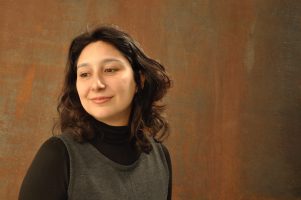
Ana Mannarino is an art historian and professor of Art History at School of Fine Arts at Federal University of Rio de Janeiro (EBA-UFRJ) and at Visual Arts Postgraduate Program at Federal University of Rio de Janeiro (PPGAV-UFRJ). She received her PhD in Art History/Visual Arts at PPGAV-UFRJ and participated in a yearlong collaborative study program at Université Sorbonne Nouvelle-Paris 3. Her doctoral thesis, “Word in Brazilian Art: Mira Schendel and Waltercio Caldas,” focuses on the relationship between text and image in Brazilian contemporary art, especially in the work of these two artists. Her research also considers modern art and historiography of art in Brazil, the connections between art and poetry, Concrete art, and the production of artists’ books.
This program is made possible with support from Getty through its Connecting Art Histories initiative.

CAA-Getty International Program 2024: Applications now open!
posted by CAA — July 06, 2023
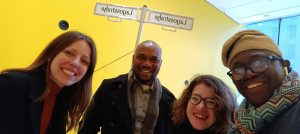
Photo: Stephen Fọlárànmí
Getty has awarded College Art Association (CAA) a grant to fund the CAA-Getty International Program for a thirteenth consecutive year. The Getty Foundation’s support will enable CAA to bring twelve international visual-arts professionals to the 112th Annual Conference, taking place in Chicago, February 14–17, 2024. These individuals will be first-time participants in the program and will be accompanied by alumni of the program returning to present papers during the conference.
Participants will receive funds for travel expenses, hotel accommodations, per diems, conference registrations, and one-year CAA memberships. We encourage all international art historians, art history educators, and museum curators to apply. The program will also include a one-day preconference colloquium on international issues in art history on Tuesday, February 14, as well as ongoing engagement with other alumni from the program online and at future conferences. The deadline for applications is August 15, 2023. Guidelines and application can be found here.
In 2021, CAA organized a publication to celebrate ten successful years of the CAA-Getty International Program. The publication, entitled Global Conversations: 10 Years of the CAA-Getty International Program features in-depth accounts of the program, a timeline of important events and milestones, and directories of past papers, members, and meetings.
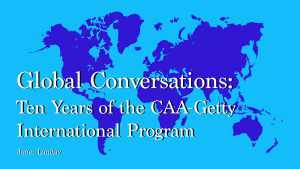
The CAA-Getty International Program was established to increase international participation in CAA and the CAA Annual Conference. The program fosters collaborations between North American art historians, artists, and curators and their international colleagues and introduces visual arts professionals to the unique environments and contexts of practices in different countries.
Since it began in 2012, the program has brought 159 scholars to the conferences, from over 50 countries located in Central and Eastern Europe, Asia, Southeast Asia, Africa, the Caribbean, and Central and South America. Each year, a preconference colloquium on international topics in art history inaugurates the week, kicking off four days of conference sessions, meetings with new colleagues, and visits to museums and galleries. Subsequent to these events, the program has generated many scholarly collaborations, including publications, conferences, and exhibitions.
Most of all, former grant recipients have become ambassadors of CAA in their countries, sharing knowledge gained at the Annual Conference with their colleagues at home. Past recipients have said that “variety of topics presented also exposed me to the realization that there is so much to be done to unearth the hidden treasures of global art history, which hitherto I have overlooked in my discipline and nation but which will now form the basis of my future projects,” and “the direct contact with other global south researchers is an unique occasion, rarely possible and extremely enriching.”
Meet the 2023 CAA-Getty International Program Participants
posted by CAA — November 29, 2022
CAA is pleased to announce this year’s participants in the CAA-Getty International Program. Now in its twelfth year, this international program, supported by the Getty Foundation, welcomes twelve new participants and four alumni to attend the 2023 Annual Conference in New York City. The goal of the CAA-Getty International Program is to increase international participation in CAA’s activities and the field of visual arts in academia, thereby expanding international networks and the exchange of ideas both during and after the conference. We look forward to welcoming this year’s participants!
At a pre-conference colloquium, the new participants will discuss key issues in the international study of art history together with CAA-Getty alumni and US hosts. The program will delve into topics such as postcolonial and Eurocentric legacies, decolonization of museums, scholarship and pedagogy, interdisciplinary and transnational methodologies, and the intersection of politics and art history. Learn more about the first ten years of the program in our online publication.
Program participants—art historians, curators, and artists—hail from multiple countries, expanding CAA’s international membership and contributing to an increasingly diverse community of scholars and ideas. Selected by a jury of CAA members from a highly competitive group of applicants, each participant will receive funding for travel, hotel accommodation, conference registration, CAA membership, and a per diem.
Alumni invited back to the 2023 conference will present at the Global Change, Crisis, and the State of the Visual Arts session while also connecting our new participants with our burgeoning group of nearly 150 CAA-Getty International Program alumni.
2023 PARTICIPANTS IN THE CAA-GETTY INTERNATIONAL PROGRAM
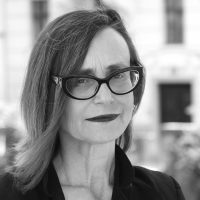
Marina Grzinic is a principal research associate at the Research Centre of the Slovenian Academy of Sciences and Arts (ZRC SAZU) in Ljubljana, Slovenia, where she is affiliated with the Institute of Philosophy. She holds a PhD in philosophy and is an artist with a forty-year career. She has been a professor at the Academy of Fine Arts Vienna, Austria, since 2003, in charge of the Studio of Conceptual Art (Post-Conceptual Art Practices) at the Institute of Fine Arts. Grzinic is the principal investigator of the Austrian Science Fund and Programm zur Entwicklung und Erschließung der Künste (FWF-PEEK) project “Conviviality as Potentiality” (2021–25). She was also the principal investigator of the FWF-PEEK project “Genealogy of Amnesia (Opposing Colonialism, Antisemitism and Turbo-Nationalism)” (2018–21). Her areas of expertise include contemporary philosophy, contemporary art, the study of coloniality and decoloniality, transfeminism, the analysis of racism, antisemitism, nationalism, and the study of memory and history in the context of resistance.
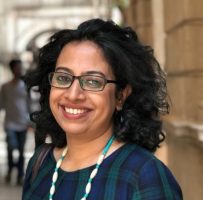
Amrita Gupta is an art historian, writer, educator, and editor who works across art education and cultural management. In 2002, she joined the Mohile Parikh Center (MPC), Mumbai, and became its program director in 2005, facilitating critical thinking by curating a wide range of innovative art education programs. She runs the website V-IDEO: Ideas worth Sharing, an archive of short videos on Indian artists for which MPC is the knowledge partner. She received an MFA in art history from Viswabharati University, Santiniketan 2002.
Her writings on modern and contemporary art have been published in anthologies, journals, and websites in India and internationally, and she has authored and edited art books for children. She was a visiting lecturer in art history at the Sir J. J. School of Art, Mumbai; a fellow at ARThink South Asia (ATSA); a research grantee from the India Foundation for the Arts, and curatorial advisor for Art1st Foundation, Mumbai. Her current art historical research is on Northeast India, framing the region as a “critical art geography” where one can attend to meanings that engage with global modernism and heterodox contemporaneity drawn through one’s own historical position. An essay from this research has been published in the book 20th Century Indian Art (Thames & Hudson, 2022). She is cofounder and executive editor of the independent e-journal, Partition Studies Quarterly which focuses on partition stories of Northeast India within the larger discourse of the partition in the subcontinent.
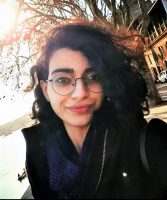
Delaram Hosseinioun was born and reared in Tehran, Iran, and seeks to reflect the voice of Persian women in creative and comparative narratives in spite of borders and restrictions. Delaram received an MA in literary criticism from the University of Exeter and another in cultural studies from KU Leuven University. Through her PhD project at Utrecht University, titled “Unveiling the Other: The Metamorphosis of Feminist Persian Art from the Mid-Twentieth Century to the Present Day,” Delaram draws from gender theories in French psychoanalysis, such as in the works of Hélène Cixous and Judith Butler, and continental philosophy, namely in the work of Mikhail Bakhtin and Jacques Derrida. Working with artists and scholars around the world, Delaram deciphers artworks as pictorial dialogues and as artists’ attempts to surpass sociocultural restrictions. The revelation and universality of the feminine voice frame her core vision. Delaram’s other passion is art journalism and interviewing artists beyond borders.
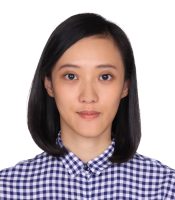
Brigitta Isabella is a researcher of art history, critical theories, and cultural studies. Her research trajectory revolves around the (im)mobility of artists and the (im)mobilization of art within the geopolitical and geoaesthetic terrains of transnational solidarity. By looking into the transnational traffic of artists, objects, and ideas, she reexamines the reciprocity between nationalism and internationalism and how artistic traces of Third World solidarity can play a discursive part in decentralizing global art history. She studied philosophy at Gadjah Mada University, Yogyakarta, Indonesia, and gained her MA in critical methodologies at King’s College, London. She is also a part of a research-action group called Kunci Study Forum & Collective and serves as the coeditor of Southeast of Now: Directions in Contemporary and Modern Art in Asia, a peer-reviewed journal published by NUS Press. She is a lecturer at the Faculty of Visual Arts in Indonesian Institute of the Arts, Yogyakarta.
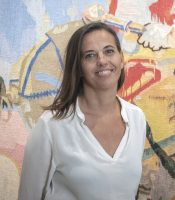
Żanna Komar, PhD, was born in Ukraine, lives in Poland, and is an art historian, theoretician of architecture, and exhibitions curator. She is a member of the academic staff at the Institute of European Heritage, part of the International Cultural Centre, Kraków, where she works as a content specialist. She specializes in urban studies, social and art history, and the theory and protection of cultural heritage. She is the author of numerous publications on the history of architecture and art, including the book Trzecie miasto Galicji. Stanisławów i jego architektura w okresie autonomii galicyjskiej (The third city of Galicia. Stanisławów and its architecture in the period of Galician autonomy, 2008). She writes about Art Nouveau, historicism, modernism, and contemporary art, and about totalitarian and modern architecture in present‑day Poland and Ukraine.
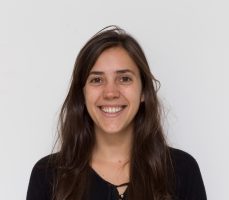
Larisa Mantovani holds a PhD in history from the Escuela Interdisciplinaria de Altos Estudios Sociales, Universidad Nacional de San Martín, Buenos Aires. She has a BA in art history and a teacher training degree in art history from Universidad de Buenos Aires. She is a postdoctoral fellow at the Research Center in Art and Heritage of the National Scientific and Technical Research Council (CIAP/UNSAM-CONICET). She works as an assistant professor of history of decorative arts I and II at the Universidad del Salvador. Both her dissertation and current postdoctoral research focus on applied arts and the links between art, education, and industry in Argentina in the first half of the twentieth century.
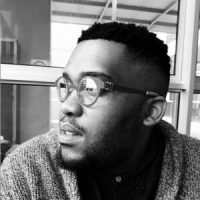
Thabang Monoa’s research interests involve art history, art criticism, visual culture, curatorial practice, and cultural studies. He completed his undergraduate studies at the Tshwane University of Technology and then went on to do a master’s degree in visual art at the Faculty of Art, Design and Architecture, University of Johannesburg. He later worked as an art historian in the faculty’s department of visual art. His doctoral study, which he undertook with the SARChI Chair in South African Art and Visual Culture, focused on the notion of Blackness in Afrofuturist aesthetics. Monoa is a member of the College Art Association (CAA) in the USA; a former council member of the South African Visual Art Historians (SAVAH); and is coconvenor of the Gerard Sekoto Winter/Summer School, which is administered through the Johannesburg Art Gallery. In his current capacity as a lecturer in Art History at the University of Cape Town’s Michealis School of Fine Art, Monoa continues to generate scholarly output concerning racial aesthetics, notions of futurity, and Black radical thought.
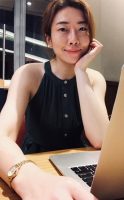
Haoxue Nie is an assistant professor at the School of Art and Humanities, Guangzhou Academy of Fine Arts. She holds a PhD in Western modern art history and theory from the China Academy of Art (2018). Her dissertation was published as a monograph in 2019 titled Beyond Boundaries: George Ault and Early Modern American Art. She was a recipient of the Getty Foundation grant for the 35th CIHA Congress (2019) and the international Travel Grant by Terra Foundation for American Art (2016).
Her research covers the first half of twentieth-century American art history, especially from the 1920s to the 1950s. Recently, she has been focusing on the visual ideology of cityscapes within this period and how they remained minor artworks in the mainstream of art history, as well as the concept of time, space, and subjectivity as formal, ideological, and psychological manifestations. The intertextuality among easel painting, modern photography, and films with urban themes in American modernism is also a part of her scholarly explorations.
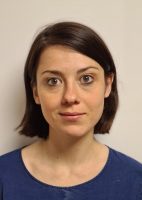
Zuzanna Sarnecka is an assistant professor of art history at the University of Warsaw (Poland). She earned her PhD in history of art at the University of Cambridge (2017). She is the author of The Allure of Glazed Terracotta in Renaissance Italy (Brepols, 2021) and coeditor of The Agency of Things in Medieval and Early Modern Art. Materials, Power and Manipulation (Routledge, 2017) and The Materiality of Terracotta Sculpture in Early Modern Europe (Routledge, 2023). Her current research focuses on the adaptation of technique of tin-glazed earthenware from the Italian peninsula across Central Europe. In her work, she aims to construct more inclusive narratives through close investigation of microhistories that have long remained ignored, not because of the lack of sources, but because of the cult of masterpieces. She promotes multisensory perspective in studies of the arts of the past, as more immediately significant for the twenty-first-century beholder, than stylistic attributions and dating.
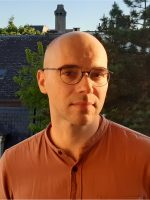
Jakub Stejskal is a MASH junior research group leader at the Department of Art History, Masaryk University, Brno, where he heads the research group Remote Access: Understanding Art from the Distant Past. He has held fellowship positions at eikones (University of Basel) and Freie Universität Berlin. He holds a PhD in aesthetics from Charles University, Prague. His research interests lie at the intersection of archaeology, art history, anthropology, and philosophical aesthetics. He is the author of Objects of Authority: A Postformalist Aesthetics (Routledge, 2022) and his work has appeared in Critical Inquiry, World Art, Journal of Aesthetics and Art Criticism, and RES: Anthropology and Aesthetics.

Cheryl Chelliah Thiruchelvam holds a PhD in art history and is currently attached to the Advertising Department, Faculty of Arts and Social Science at Universiti Tunku Abdul Rahman (UTAR), Malaysia. Her research interests are Hindu-Buddhist visual arts of the Southeast Asian region and to a lesser extent feminist studies. Her latest publication is a book chapter on the prevalence of the Ramayana epic in Malaysian visual arts for the book The Multivalence of an Epic: Retelling the Ramayana in South India and Southeast Asia (Manipal Universal Press, 2021). She also has a forthcoming coauthored essay entitled, “Tracing Indian Cultural Connections in Malaysia and Brunei: From Early Candis to Modern Art,” for the book Connected Histories of India and Southeast Asia: Icons, Narratives, Monuments that will be published by SAGE Publications India. Besides that, she is also interested in writing criticism, reviews, and commentary within the Malaysian art scene.
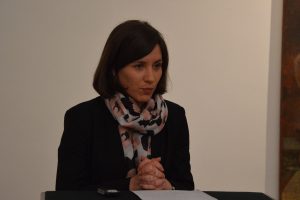
Tanja Trška is assistant professor at the Department of Art History, Faculty of Humanities and Social Sciences, University of Zagreb, Croatia, where she teaches courses on early modern art in Europe and present-day Croatia. She received her PhD in art history from the Scuola Normale Superiore in Pisa, Italy (joint supervision with the Faculty of Humanities and Social Sciences, University of Zagreb) in 2014. Her research interests center on early modern art and architecture, the exchange of cultural and artistic experiences between Italy and the eastern Adriatic coast, art patronage, and history of collections. She has collaborated on Croatian Science Foundation’s research project “Visualizing Nationhood: The Schiavoni/Illyrian Confraternities and Colleges in Italy and the Artistic Exchange with South East Europe (15th–18th centuries)” (2015–18) and is currently a team member of the research project “Provenance Research on Artwork in Zagreb Collections” (2020–24).
PARTICIPATING ALUMNI
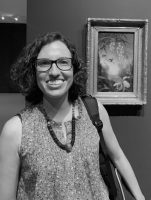
Patricia D. Meneses is an assistant professor of art history at the University of Campinas (Brazil). She earned her PhD in history of the visual arts at the University of Pisa (2009). She is the author of Baccio Pontelli a Roma. L’attività dell’architetto per Giuliano Della Rovere (Felici Editore, 2010) and editor of several books, such as Arte Não-Europeia: Conexões historiográficas a partir do Brasil (Estação Liberdade, 2020) and A imagen como experimento. Debates contemporâneos sobre o olhar (Milfontes, 2021). In 2019, she was Hans Jonas visiting professor at the University of Siegen, where she taught a course on “exotic” materials in art history. She is currently part of a Connecting Art Histories project sponsored by the Getty Foundation (“Teaching and Researching Non-European Art at Brazilian Universities”). Her research focuses on the connections between art, science, and ecology in the nineteenth century.
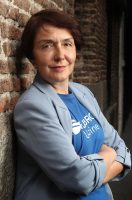
Natalia Moussienko is a leading research fellow at the Modern Art Research Institute of the National Academy of Arts of Ukraine (Kyiv). She is the author of numerous books and articles on art history, cultural diplomacy, cinema, and urbanism, including Art of Maidan (2016), Kyiv Art Space (2013), and Arts and Politics (2002). In 2016 the National Academy of Arts of Ukraine awarded Dr. Moussienko a gold medal for her achievements in cultural diplomacy. She was also awarded a Fulbright scholarship to conduct research at the Kennan Institute, Wilson Center, in Washington, DC (2011–12), and a Thesaurus Polonia Fellowship to study at the International Cultural Center in Krakow (2017 and 2022). Dr. Moussienko is an initiator and curator of Art of Maidan, a continuing project begun in 2014 to document the explosion of artistic creativity during the Revolution of Dignity in 2013–14 and a Russo-Ukrainian war premonition in it. Central to the project is a book and exhibition that has already been presented in nineteen locations in Ukraine, the United States, and Europe.

Shenouda Rizkalla Fahim Youssef is a trained archaeologist with extensive experience in archaeological fieldwork, database and collections management, and community outreach. His current research focus is on the museum practices in the Egyptian provinces, using the Akhenaton Museum in Minya, Egypt, as a case study. The museum, opening in 2023, will focus on the site of Tell el-Amarna, where the famous bust of Nefertiti, currently exhibited in the Egyptian Museum in Berlin, was found. The aims of the presentation are to analyze the archival resources for the history of the museum, develop community outreach programs by engaging the local population with the collection, and using this to develop avenues for future outreach activities. The results will be related to wider discussions of repatriation and postcolonial heritage management in Egypt.
Rizkalla received a PhD in Egyptology from Helwan University, Egypt. His research has been diverse, working on recording and translating Ptolemaic Period hieroglyphics, creating and executing site management strategies, and addressing the looting of archaeological sites. He has been a member of many excavations and site management missions in Egypt since 2012, has given numerous presentations and invited talks, and has written a number of academic reports and publications.

J. Kelechi Ugwuanyi is a senior lecturer in the department of archaeology and tourism, University of Nigeria, Nsukka. He is currently a postdoctoral research fellow at the Global Heritage Lab, Transdisciplinary Research Area: Present Pasts, University of Bonn, Germany. Kelechi has a PhD in heritage studies from the University of York, UK, and MA and BA in archaeology and tourism as well as a diploma in tourism and museum studies from the University of Nigeria. He is a coeditor of the Journal of African Cultural Heritage Studies and sits on the editorial board of the Studies in Contemporary and Historical Archaeology in Theory book series published by the Archaeopress. Kelechi’s research interests are critical heritage studies, museum, Indigenous knowledge systems, tourism, and contemporary archaeology. His current research revisits the originating communities of ethnographic archives collected from Africa during colonialism to reengage members of the descendant communities to understand their changing significance in the present.
Register for Global Conversations: Materiality and Mediation
posted by CAA — August 08, 2022
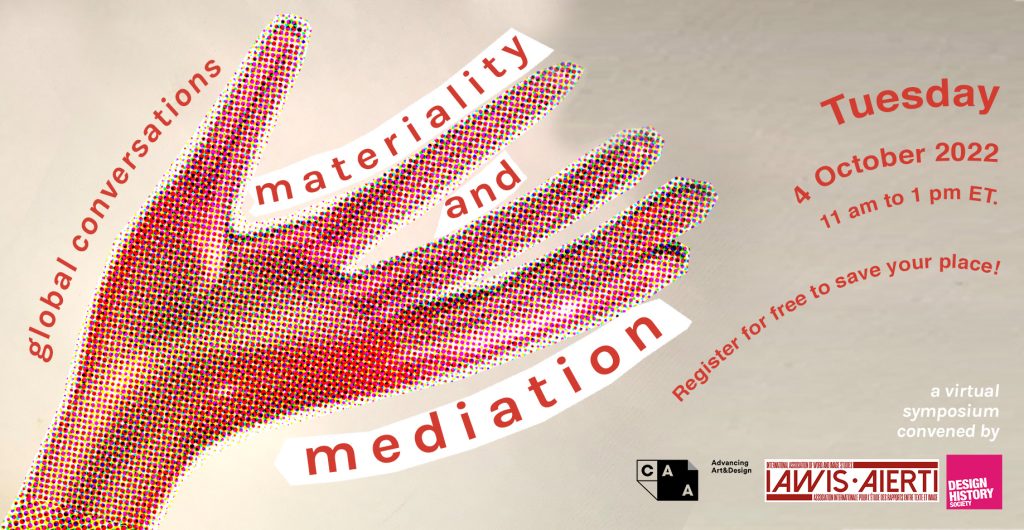
Join us this fall for the virtual symposium, Global Conversations: Materiality and Mediation, on October 4, 2022, organized by CAA and two of its international affiliated societies, the Design History Society and the International Association of Word and Image Studies.
To register for the event, visit this page. The event will take place from 11 am to 1 pm Eastern time.
This global collaborative project brings together three intersecting constituencies—art and design, design history, and word and image studies—to examine how materiality and mediation intersect.
Six participating scholars will present on the following topics, followed by Q&A and discussion. The event will be recorded and shared online following the event.
- “Tavolino di gioie”: The Mediation of Material Techniques in Late Cinquecento Hardstone Inlaid Tables – Wenyi Qian, Ph.D. Candidate in Art History, University of Toronto, Toronto
- Mediating the Meaning of Textiles through Exhibition Displays in Israel, 1950s-1970s – Noga Bernstein, Marie-Sklodowska Curie Visiting Researcher, Hebrew University of Jerusalem
- Made in Japan: Development of the Poster Medium in Japanese Commercial Art and Design – Nozomi Naoi, Associate Professor of Humanities, Yale-NUS College, Singapore Erin Schoneveld, Associate Professor of East Asian Languages and Cultures and Director of Visual Studies, Haverford College, Haverford, Pennsylvania
- Mine Craft: Design Histories of Mining – Ellen Huang, Associate Professor of Art and Design History, ArtCenter College of Design, Pasadena, California Arden Stern, Assistant Professor of Humanities and Sciences, ArtCenter College of Design, Pasadena, CA
This no-cost event is open to the public. Please consider donating to support no-cost programming and providing access to new and emerging scholarship.
CAA’s membership program connects you to the largest community of individuals and organizations working together and advocating to advance research, practice, and the impact of the visual arts. Visit our website for more information and to join our organization.
Arts organizations interested in joining CAA as an affiliated society can do so by visiting our website.
To join the Design History Society, please visit this page.
To join the International Association of Word and Image Studies, please visit this page.

CAA-Getty International Program 2023: Applications now open!
posted by CAA — July 06, 2022
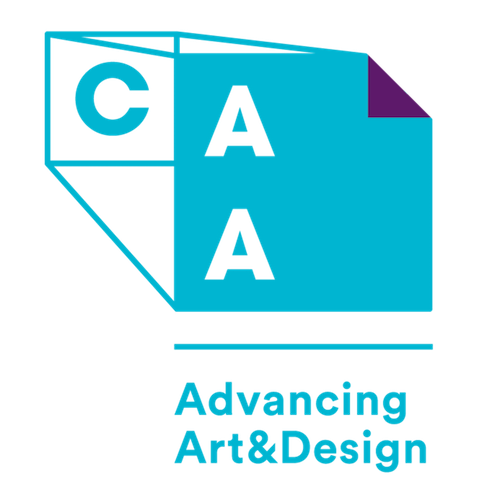
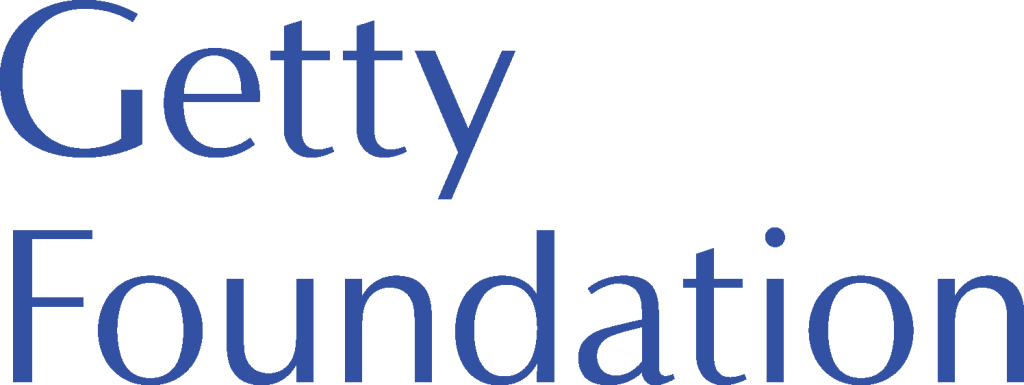
The Getty Foundation has awarded the College Art Association (CAA) a grant to fund the CAA-Getty International Program for a twelfth consecutive year. The Foundation’s support will enable CAA to bring twelve international visual-arts professionals to the 111th Annual Conference, taking place New York, NY, February 15–18, 2023. These individuals will be first-time participants in the program and will be accompanied by alumni of the program returning to present papers during the conference.
Participants will receive funds for travel expenses, hotel accommodations, per diems, conference registrations, and one-year CAA memberships. We encourage all international art historians, art history educators, and museum curators to apply. The program will also include a one-day preconference colloquium on international issues in art history on Tuesday, February 14, as well as ongoing engagement with other alumni from the program online and at future conferences. The deadline for applications is August 15, 2022. Guidelines and application can be found here.
Last year, CAA organized a publication to celebrate ten successful years of the CAA-Getty International Program. The publication, entitled Global Conversations: 10 Years of the CAA-Getty International Program features in-depth accounts of the program, a timeline of important events and milestones, and directories of past papers, members, and meetings.
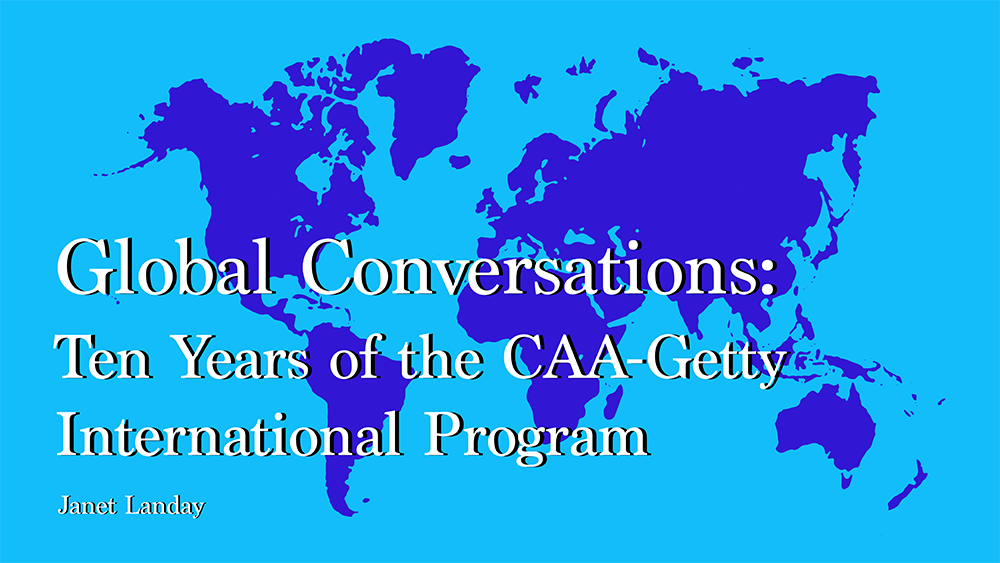
The CAA-Getty International Program was established to increase international participation in CAA and the CAA Annual Conference. The program fosters collaborations between North American art historians, artists, and curators and their international colleagues and introduces visual arts professionals to the unique environments and contexts of practices in different countries.
Since it began in 2012, the program has brought 147 scholars to the conferences, from over 50 countries located in Central and Eastern Europe, Asia, Southeast Asia, Africa, the Caribbean, and Central and South America. Each year, a preconference colloquium on international topics in art history inaugurates the week, kicking off four days of conference sessions, meetings with new colleagues, and visits to museums and galleries. Subsequent to these events, the program has generated many scholarly collaborations, including publications, conferences, and exhibitions.
Most of all, former grant recipients have become ambassadors of CAA in their countries, sharing knowledge gained at the Annual Conference with their colleagues at home. Past recipients have said that “variety of topics presented also exposed me to the realization that there is so much to be done to unearth the hidden treasures of global art history, which hitherto I have overlooked in my discipline and nation but which will now form the basis of my future projects,” and “the direct contact with other global south researchers is an unique occasion, rarely possible and extremely enriching.”
Global Conversations: Mentoring Beyond the Classroom
posted by CAA — April 21, 2022
Filmed at the National Museum of Mexican Art, this program features a discussion about mentoring between two Chicago-based artists, Rubén Aguirre and Dan Ramirez, mediated by Cesáreo Moreno, Director and Curator of the National Museum of Mexican Art. Their conversation takes place inside the Aguirre’s exhibition Tectonic Reflections, open at the National Museum of Mexican Art until July 24. This program was a part of the session, “Mentoring Beyond the Classroom: The Continuing Relationship Over Time,” at CAA’s 2022 Annual Conference in February, chaired by Richard Serrano, a member of CAA’s Services to Artists Committee.
Meet the 2022 CAA-Getty International Program Participants
posted by CAA — December 22, 2021
We’re pleased to announce this year’s participants in the CAA-Getty International Program. Now in its eleventh year, this international program supported by the Getty Foundation will all twelve new participants and four alumni to participation in the 2022 Annual Conference. Learn more about the first ten years of the program in our online publication.
At a pre-conference colloquium, the new participants will discuss key issues in the international study of art history together with CAA-Getty alumni and US hosts. The program will delve into topics as postcolonial and Eurocentric legacies, interdisciplinary and transnational methodologies, and the intersection of politics and art history.
Alumni invited back to the 2022 conference will present in the session Can Art History Be Affective? Empathy, Emotion and the Art Historian, chaired by Getty alumni and International Committee members Nora Veszpremi and Cristian Nae, while also providing an intellectual and social link between new participants and our burgeoning group of CAA-Getty International Program alumni.
The goal of the CAA-Getty International Program is to increase international participation in CAA’s activities and the field of visual arts in academia, thereby expanding international networks and the exchange of ideas both during and after the conference. We look forward to welcoming the following participants.
2022 PARTICIPANTS IN THE CAA-GETTY INTERNATIONAL PROGRAM

Tatiana Muñoz Brenes is an art curator and researcher. She has combined the exercise of cultural management with Social Sciences by having degrees in Art History and Psychology, both from the University of Costa Rica. Her training has allowed her to work on the topics of community museums, sustainability, collection research, curating exhibitions and curatorial accompaniment for artistic production. Currently, her work focuses mainly on queer art and the LGBTIQ+ community in Latin America. In addition, she has extensive experience in international projects, lectures, publications and museum training in Scotland, Portugal, Spain, China, Japan, Ecuador, and other countries. Projects can be found at www.arthistorylady.com
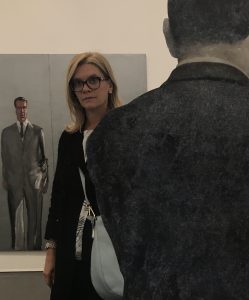
Simona Cupic is Professor at the Department of Art History, University of Belgrade, Serbia. Her fields of research and teaching include art and culture between the World Wars, and the 1950s and 1960s. She is particularly interested in the visual and popular culture between 1920s and 1960s. She is the author of Mona Lisa & Superman. John F. Kennedy and the New Frontier of the Culture (2016), Elain de Kooning. Portraits (with Brandon Brame Fortune, Ann Eden Gibson, 2015), The JFK Culture (edited volume, 2013), and Bourgeois Modernism and Popular Culture. Episodes of the Fashionable, Faddish and Modern (1918-1941) (2011), among others.
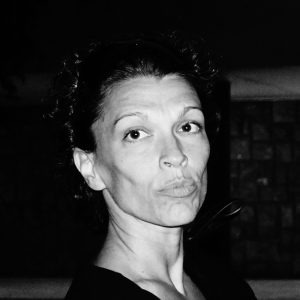
Anica Draganić is an architectural historian, conservator and multimedia artist who currently serves as an Associate Professor at the University of Novi Sad, Serbia. She received her PhD in Architectural History and Heritage Preservation from the University of Belgrade with a dissertation on Austro-Hungarian historical breweries. Her work focuses on nineteenth- and twentieth-century European architecture, with particular emphasis on industrial heritage and identity issues in the intercultural context of Central Europe. Her extensive research on the architectural heritage of the Vojvodina region has been published in journals, conference proceedings, and books, but also presented in numerous exhibitions. Her most recent book, Shadows and Silhouettes of Industrial Past of Vojvodina, shows the complexities of the socio-political context in which the industrial architecture of a specific multicultural region emerged, developed and disappeared. She is currently particularly interested in European architecture from the socialist period, exploring its historical values and contemporary potential.
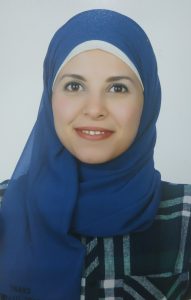
Heba Khairy Metwaly is an Exhibition coordinator at the Grand Egyptian Museum. She Oversees and provide rigorous, accurate and efficient exhibition coordination and follow up all aspects of exhibition development between all partners in the GEM. She is a PhD researcher specialized in the Collection Management and Documentation Practices in different museums. Heba has participated in many international and national field projects and studies focusing on the tangible and intangible material culture preservation and local community engagement and development. Heba has participated in the development of the daily life gallery “P34” at the Egyptian Museum of Cairo, the European Union Funding Project of Transforming the Egyptian Museum. In 2017 she participated in the British Museum International Training Program, where she curated the Object in Focus temporary exhibition. She Also participated in many international conferences focusing on the preservation of museum collection and exhibition design.
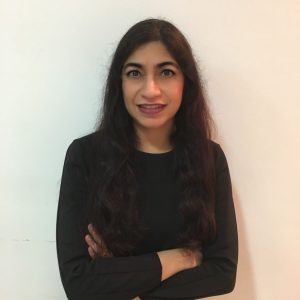
Roma Madan Soni is an art historian with a PhD from the University of Wolverhampton, an Assistant professor at Box Hill College Kuwait, an ecofeminist-artist, and a researcher. Her art, teaching, and research are interdisciplinary, positioned at the node of ecofeminism: practice, theory and history, and contemporary visual politics. Her articles are published in Journal of Visual Art Practice, Feminist Media Studies, Ecofeminism and Climate Change, Crafts Research, Art & The Public Sphere, Necsus, International Feminist Journal of Politics, Journal of Gender Studies, Swasti, and a chapter in Cambridge Scholars. She collaborated for conference presentations and conducted workshops at CAA, SVIMS-Pune, JNU, LSR, Raza Foundation, University of Wolverhampton, Kuwait-Nuqat, KISR, TEDx Global Day- Gulf University of Science and Technology, Dar Al Athar-Yarmouk, Kuwait University, American University of Kuwait, Box Hill College Kuwait, American Open University, UN Habitat and Beit Sadu. She has exhibited at Kunsthaus-Steffisburg, TAPRI-Finland, DarAlAthar AlIslamiyah, The Scientific Centre Kuwait, MOMA-Kuwait, Masaha13, Artsy, Mayinart, Artling, Saatchi galleries, and painted the book-cover for Routledge Handbook of Feminist Peace Research (2021). Research grants, commissions and awards from The Scientific Centre Kuwait, Kuwait Foundation of Advanced Sciences, Kuwait Institute of Scientific Research, UN Habitat, and Arab Open University aided her research and creations. She is a member of the Museum Committee and a Reader for the Council of Readers at CAA. I chair the “Transformative Education Think Tank”-Collective Impact Coalition-Konrad Adenauer Stiftung to address Kuwait’s academic challenges. Her work has been accepted at the Venice Art Fair and Florence Biennale 2021.
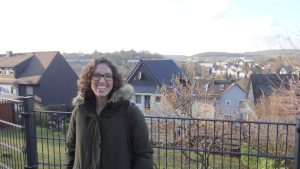
Patricia D. Meneses is an assistant professor of Art History at the University of Campinas (Brazil). She earned her PhD in History of the Visual Arts at the University of Pisa (2009). She is the author of Baccio Pontelli a Roma. L’attività dell’architetto per Giuliano Della Rovere (Felici Editore 2010) and editor of several books, such as Arte Não-Europeia. Conexões historiográficas a partir do Brasil (Esta ção Liberdade 2020), and A imagen como experimento. Debates contemporaneous sobre o olhar (Milfontes 2021). Recently, she was Hans Jonas visiting professor at the University of Siegen (2019), where she taught a course on “exotic” materials in Art History. She is currently part of a Connecting Art Histories project sponsored by the Getty Foundation (“Teaching Non-European at Brazilian Universities”). Her research focuses on the connections between art, science and ecology in the nineteenth-century. She is presently developing a book project about hummingbird’s ecology in Brazilian visual culture.
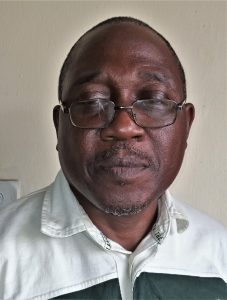
Akinwale Onipede is an art historian, researcher and teacher at the University of Lagos, Nigeria. He trained at the University of Benin, and, the University of Lagos, where he works in the area of the interface of global and local cultures and identities as expressed in visual arts. His main interest is in how developments globally in the philosophies, techniques, products and opportunities in visual arts, have affected its contemporary practice and direction in Nigeria. The universalization of cultures, consequent upon globalization, he argues, is skewed in favor of the West, whose culture is endorsed, whose pocket is deepest and whose machinery is most efficient, in the promotion of the direction of visual arts studies, practice, articulation and documentation. He is of the position that the continent that produced the great pyramids, the Nok, Igbo Ukwu, Ife and Benin masterpieces should play crucial roles in contemporary promotion of the arts.
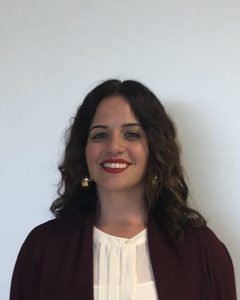
Melissa M. Ramos Borges is an art historian with a predilection for the (re)vision of the discipline. She obtained her doctorate from the Programa de Estudios Artísticos, Literarios y Culturales with a specialty in Art History at the Universidad Autónoma of Madrid, where she presented the first comprehensive study of avant-garde art produced between 1960-1980 in Puerto Rico. She is a professor of Art History and Theory at the University of Puerto Rico, Mayagüez and Río Piedras Campus. In addition, she is an independent researcher and curator who has published and presented her exhibitions and articles in various international platforms. She curated SUZI FERRER, the first retrospective exhibition of the groundbreaking feminist avant-garde artist, presently on view at the Museo de Arte y Diseño de Miramar. She is currently working on publishing a catalogue with contributions from various scholars which will accompany an upcoming traveling SUZI FERRER exhibition.
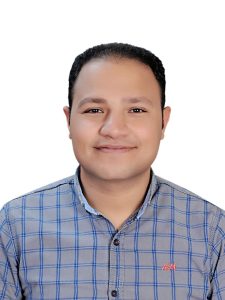
Shenouda Rizkalla is a trained archaeologist with extensive experience in archaeological fieldwork, database and collections management, and community outreach. His current research focus is the museum’s role in preserving the local community identity, applied to the content and display of the Sharm El-Sheikh museum and build up a sustainable community outreach program by engaging the local population with the collection and relate the results to wider discussions of repatriation and post-colonial heritage management in Egypt. Rizkalla is an Egyptology PhD graduate from Helwan University-Egypt. His research to date has been diverse, working on recording and translating Ptolemaic Period hieroglyphics, creating and executing site management strategies, and addressing the looting of archaeological sites. He is a member of many excavations and site management missions inside Egypt since 2012. He has many Presentations and Invited Talks, Academic Reports and Publications.
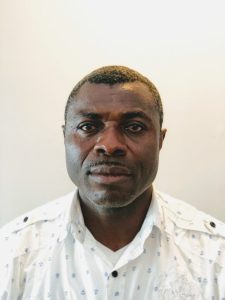
Nsima Stanislaus Udo is a Nigerian and an Africanist scholar. He completed his BA in History and International Relations in Ile-Ife, Nigeria. He then proceeded to South Africa where he completed his Honors and MA degrees (cum laude) at the University the Western Cape in Visual History and Theory. He lives in Cape Town and is a doctoral candidate at the University of the Western Cape. His research interest is in African cultural studies: in thinking around visual representations, histories and meanings of African cultural and festival practices. His doctoral research is currently looking at the history of Calabar Festival and Carnival, Nigeria. He is exploring the multiple-layered cultural, visual, aesthetic, economic and secular representations of this complex and elaborate festival. Nsima Stanislaus Udo presently serves as a teaching and research assistant at the Faculty of Art in the same university.
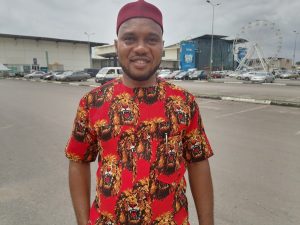
John Kelechi Ugwuanyi is a senior lecturer and the coordinator of postgraduate studies in the Department of Archaeology and Tourism, University of Nigeria, Nsukka. He had his PhD in heritage studies at the University of York and MA and BA in Archaeology and Tourism at the University of Nigeria. His research interest is critical heritage studies, museum, indigenous knowledge systems, tourism, and contemporary archaeology. He is the co-editor of Journal of African Cultural Heritage Studies and sits on the editorial board of the Studies in Contemporary and Historical Archaeology in Theory book series published by the Archaeopress in Oxford as part of the British Archaeological Report series of monograph. Kelechi has published in national and international journals of repute. He is a fellow of the American Council of Learned Societies and a recipient of other scholarship/grant including the Overseas Research Scholarship of the University of York, UK.
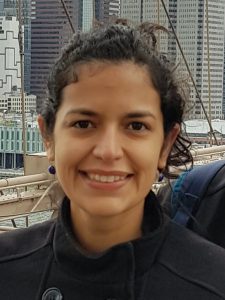
Elizabeth Catoia Varela holds a PhD in History and Criticism of Art from the Federal University of Rio de Janeiro, Brazil (2016). She worked at the Research and Documentation Center of the Modern Art Museum of Rio de Janeiro – MAM Rio (2009-2021). Her dissertation was published as a book in 2017 (Concrete Art Beyond Europe: Brazil, Argentina and the MAM Rio). She published other three books about the history of the museum. Varela was the curator of the exhibition “MAM: its history, its heritage” (2013-2016). She was awarded in 2020 with the AAM-Getty International Program/American Alliance of Museums and is a member of the College Art Association (CAA) and the International Council of Museums (ICOM).
PARTICIPATING ALUMNI
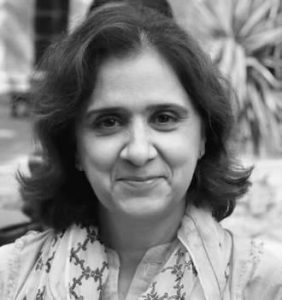
Nadhra Shahbaz Khan is Associate Professor of Art History and the Director of the Gurmani Centre for Languages & Literature at LUMS, Lahore, Pakistan. A specialist in the history of art and architecture of the Punjab from the sixteenth to the early twentieth century, Dr. Khan’s research covers the visual and material culture of the region during the Mughal, Sikh, and colonial periods. Her interest lies in investigating levels of human agency behind artefacts and architectural spaces, both as creators and consumers to understand their political, religious and socio-economic ambitions at different historical intersections. Her publications, conference papers and other research activities spread over more than a decade, especially her book titled Maharaja Ranjit Singh’s Samādhi in Lahore: A Summation of Sikh Architectural and Decorative Practices has successfully brought Sikh art and architecture to the forefront of Pakistan’s heritage discussions and conservation activities.
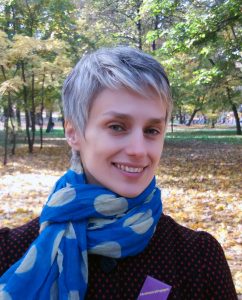
Halyna Kohut is an associate professor in the Faculty of Culture and Arts at the Ivan Franko National University of Lviv, Ukraine, where she teaches history of art, contemporary art, feminist art, and history of theatrical costume. Educated as an artist, she received her Ph.D. from the Lviv National Academy of Arts. Kohut is the CAA-Getty International Program alumna and a recipient of scholarships and grants from the Samuel H. Kress Foundation, Austrian Agency for International Mobility and Cooperation, the Canadian Institute of Ukrainian Studies at the University of Alberta, and the Queen Jadwiga Foundation at the Jagiellonian University in Cracow. Kohut specializes in eighteenth-century East European carpets and kilims. Her most recent research interest focus on woman art in Soviet Ukraine. She is especially interested in how ideology informed the identities of women artists and how they challenged that ideology with their art practices.
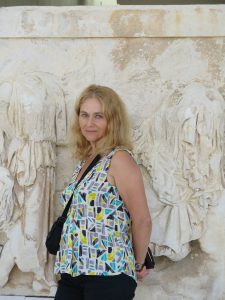
Irena Kossowska graduated from the Warsaw University in 1980. She obtained a Ph.D. degree and Habilitation at the Institute of Art of the Polish Academy of Sciences, in 1990 and 2001 respectively. Currently she is Full Professor of Art History at the Nicolaus Copernicus University in Torun, and at the Polish Institute of World Art Studies in Warsaw. She specializes in the field of nineteenth- and twentieth-century visual arts, art theory, and criticism. She is the recipient of numerous awards and fellowships, including from the Bogliasco Foundation, Center for Advanced Study in the Visual Arts, Smithsonian Institution, Zentralinstitut für Kunstgeschichte, National Humanities Center, Institut national d’histoire de l’art, Henry Moore Institute, and the British Academy. She has written extensively on Polish and European art, including Artistic Reconquest: Art in Interwar Poland and Europe, The Search for Cultural Identity in Eastern and Central Europe 1919-2014, Symbolism and Young Poland; Reinterpreting the Past: Traditionalist Artistic Trends in Central and Eastern Europe of the 1920s and 1930s; and The Beginnings of Polish Original Printmaking 1897-1917.
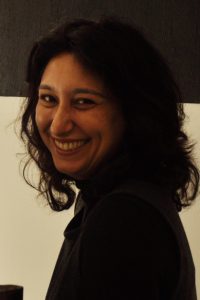
Ana Mannarino is an art historian and a professor of art history in the School of Fine Arts and the Visual Arts Postgraduate Program at the Federal University of Rio de Janeiro, where she received her PhD in history of arts and visual arts. Her research focuses on Brazilian modern and contemporary art, particularly on the relationship between text and image, art and poetry, and the production of artists’ books.



